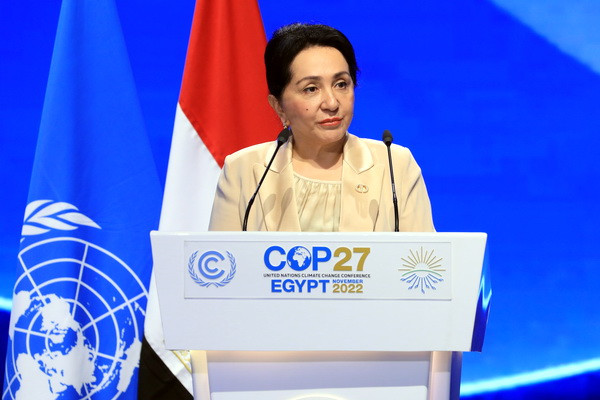
Tanzila Narbayeva speakes at the 27th Conference of the Parties to the UN Framework Convention on Climate Change
Tashkent, Uzbekistan (UzDaily.com) -- The 27th Conference of the Parties to the United Nations Framework Convention on Climate Change (COP-27) is being held these days in Sharm el-Sheikh, the Arab Republic of Egypt. The event serves as a forum to share best practices on existing scientific evidence and assessments of climate mitigation tools. The subject of discussion was the obstacles standing in the way of the implementation of climate solutions.
This conference has been held annually since 1995. This year, issues of implementing financing for climate change mitigation and adaptation projects are being considered.
The event is attended by a delegation of Uzbekistan headed by Chairperson of the Senate of the Republic of Uzbekistan Tanzila Narbayeva. In her speech, the Chairwoman of the Upper House of Parliament stated that only through joint efforts can we counter the problem of climate change, the consequences of which are also acute in Central Asia.
“The main goal of Uzbekistan is to achieve economic progress by integrating the principles of a green economy into ongoing structural reforms. The priority in this direction is low-carbon development and resource saving in all sectors of the economy, the introduction of efficient and environmentally friendly technologies,” said Tanzila Narbayeva.
Under the Paris Agreement, Uzbekistan reaffirms its commitment to reduce greenhouse gas emissions per unit of GDP by 35% by 2030. To achieve these goals, large-scale programs for the introduction of renewable energy sources have been launched.
By 2026, it is planned to increase the share of "green" energy to 8,000 MW, which will reduce carbon dioxide emissions by 5 million tons. By 2030, the energy efficiency of the economy is planned to be doubled, and the share of renewable energy to at least 25%.
Mitigation of the consequences of climate change in the republic and adaptation to them are largely facilitated by the nationwide project "Yashilmakon" ("Green Space"), which provides for the annual planting of 200 million trees and shrubs, as a result of which, in five years, the area of green spaces in cities will increase from the current 8 up to 30%. For the purpose of efficient use of water resources, large-scale reforms are being carried out in the country with the widespread introduction of water-saving technologies.
Uzbekistan is taking decisive action to resolve the problems associated with the Aral Sea crisis. Over the past five years, more than 1.7 million hectares of forest plantations have been planted on the dried bottom of the Aral Sea, and by 2026 this figure will reach up to 2.5 million hectares, or almost 80% of the territory. By a special resolution of the UN General Assembly, the Aral Sea region was declared a zone of environmental innovations and technologies.
During her speech, the Chairman of the Senate of the Oliy Majlis of the Republic of Uzbekistan Tanzila Narbayeva noted that the country is ready for active interaction with the international community and proposes to create a regional Climate Council, which will increase the effectiveness of cooperation in promoting climate adaptation projects, combating desertification and land degradation , introduction of water-saving technologies.
Next year, Uzbekistan plans to hold two major UN events to combat desertification and conserve migratory species of wild animals and invites all international partners to take an active part in the work of these forums.